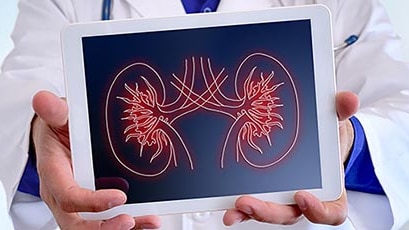Key points
- Post-streptococcal glomerulonephritis (PSGN) can occur after streptococcal pharyngitis or skin infections.
- PSGN often requires hospitalization, but mild or subclinical cases can occur.
- The prognosis for PSGN is good, especially for children.
- Treatment focuses on symptom management and giving antibiotics.
- Follow recommended guidelines when caring for patients with PSGN.

Cause
PSGN is caused by certain strains of Streptococcus pyogenes. These bacteria are also called group A Streptococcus (group A strep bacteria).
As sequela of streptococcal pharyngitis or pyoderma, PSGN is characterized as
- Delayed (up to 3 weeks following infection)
- Immunologically mediated
- Nonsuppurative
Latent period
Following group A strep pharyngitis: PSGN occurs after a latent period of approximately 10 days.
Following streptococcal skin infections: PSGN occurs up to 3 weeks later.
Risk factors
There are no known risk factors specific for PSGN. PSGN is more common in children, particularly pre-school and early school aged children. However, it can also occur in adults.
Risk factors for PSGN are the same as for the preceding infection:
Clinical features
The clinical features of acute glomerulonephritis include:
- Edema
- Hypertension
- Proteinuria
- Macroscopic hematuria, with urine appearing dark, reddish-brown
- Complaints of lethargy, generalized weakness, or anorexia
Edema is often pronounced in the face and around the eyes, especially on arising in the morning.
Laboratory findings
Laboratory examination usually reveals:
- Mild normocytic normochromic anemia
- Slight hypoproteinemia
- Elevated blood urea nitrogen and creatinine
- Elevated erythrocyte sedimentation rate
- Low total hemolytic complement and C3 complement
Patients usually have decreased urine output. Urine examination often reveals protein (usually <3 grams per day) and hemoglobin with red blood cell casts.
Subclinical and mild illness
Subclinical cases of PSGN with only microscopic hematuria and decreased complement levels can occur1. Some individuals may have symptoms that are mild enough to not come to medical attention.
Diagnosis and testing
The differential diagnosis of PSGN includes other infectious and non-infectious causes of acute glomerulonephritis. Clinical history and findings with evidence of a preceding group A strep infection should inform a PSGN diagnosis.
Evidence of preceding group A strep infection can include:
- Isolation of group A strep from the throat
- Isolation of group A strep from skin lesions
- Elevated streptococcal antibodies
Treatment
Treatment of PSGN focuses on managing hypertension and edema.
Antibiotics
Patients should receive penicillin (preferably penicillin G benzathine) to eradicate any remaining group A strep. This will help prevent spread of the bacteria to other people.
Complications
The prognosis of PSGN in children is very good. More than 90% of children make a full recovery. Adults with PSGN are more likely to have a worse outcome due to residual renal function impairment.
Prevention
Reduce the spread of group A strep bacteria with standard infection control practices, including good hand hygiene and respiratory etiquette.
Prophylaxis
There's insufficient evidence to determine if antimicrobial therapy can prevent PSGN23.
Preventing primary illness
It's important to prevent the primary group A streptococcal skin or pharyngeal infection. Treating patients with PSGN with antibiotics can stop group A strep from circulating in a household. Thus, treating patients with PSGN can prevent additional infections among close contacts.
- Rodriguez-Iturbe B, Haas M. Post-Streptococcus pyogenes Glomerulonephritis. 2022 Sep 9 [Updated 2022 Oct 4]. In: Ferretti JJ, Stevens DL, Fischetti VA, editors. Streptococcus pyogenes: Basic Biology to Clinical Manifestations [Internet]. 2nd edition. Oklahoma City (OK): University of Oklahoma Health Sciences Center; 2022 Oct 8. Chapter 27.
- Sainato RJ, Weisse ME. Poststreptococcal glomerulonephritis and antibiotics: A fresh look at old data. Clin Ped. 2019;58(1):10–12.
- Bateman E, Mansour S, Okafor E, Arrington K, Hong B, Cervantes J. Examining the efficacy of antimicrobial therapy in preventing the development of postinfectious glomerulonephritis: A systematic review and meta-analysis. Infect Dis Rep. 2022;14(2):176–83.
